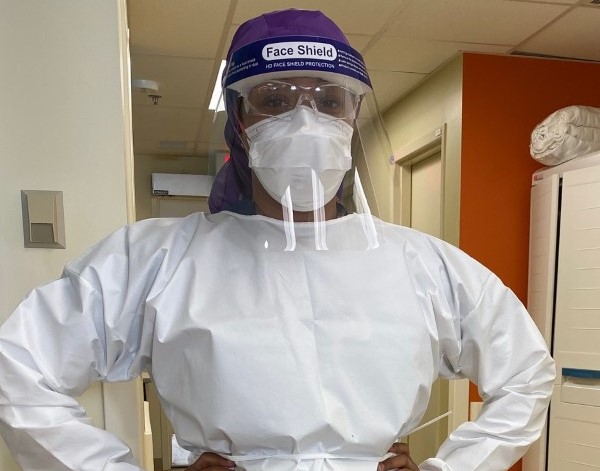
Hope Heroes: Nurse Alexis Smith
By Alexis Smith, a nurse at the Kaiser Permanente satellite emergency room in Tysons Corner, Va.
I don’t know how I got COVID. The first patient I swabbed for the coronavirus was in March, but we were bracing ourselves since the outbreak was first reported in China back in November. We thought it might already be in the U.S. because we are in a global economy and patients were testing negative for the flu with symptoms that no one could diagnose at that time.
We typically see coughs, colds, cuts, and scrapes. Some patients may come to us after being stabilized in a hospital emergency room but need more observation. On occasion, someone walks in with an emergency and then we call 911. We now have a designated COVID section of eight rooms that were unused in the back of the clinic. Things that were normally minor or easily treatable in about 15-20 minutes like children with the common cold—we now put in a COVID room if it is accompanied by a fever or abdominal pain. We now check a lot of boxes to determine whether a patient has COVID or not, and that requires so much more time and resources.
If I swabbed a patient who was later sent to a hospital, I cannot check to see if I have been exposed. For privacy reasons, I cannot go back into a patient’s file after they have been transferred out of my care. It is stressful thinking about the effect my exposure to COVID may have on my family, especially my 10-year old daughter who has asthma. When I returned to work after being sick at the end of April, our staff was already in a surge position.
We’re really providing disaster medicine. There are changes every week to how to treat it. Certain rules and regulations that would have gotten someone reprimanded or fired last year are now ok. N95 masks are not meant to be worn all day, every day in multiple patient rooms because it can cause cross-contamination.
I am a naturally caring person. That is why I became a nurse. I have been in health care for 14 years, but it is still difficult having to put people on ventilators and explain how many patients come off a ventilator. I am really proud of all of our frontline healthcare workers. We just have to hang in there. The hope we cling to as we treat this thing is that at a certain point, it will start to dwindle. All of us are hoping we will learn more about it and be more empowered to help others. We have faith that things will be different next year.
Hope Heroes is a series featuring members of VICPP’s Health Care Hope Ambassador Network sharing, in their own words, their experiences working on the COVID-19 front lines.
